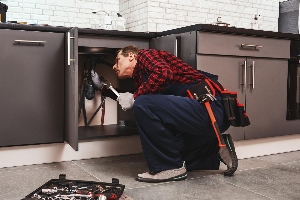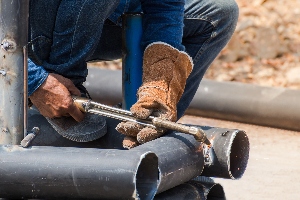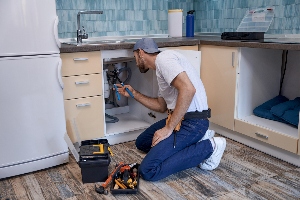Many common water heater repairs are simple DIY solutions, while others issues require professional help. Regular maintenance is key to keeping your water heater running smoothly,
This includes flushing the tank yearly to remove sediment buildup and replacing the anode rod when needed to prevent tank corrosion - two examples of how to extend your water heater's life and prevent costly repairs.
However, complex issues like faulty heating elements, gas burner problems, or tank leaks need expert attention. If you're unsure about a repair or don't feel comfortable tackling it yourself, it's always smart to call a professional plumber.
This guide breaks down the most frequent problems with tank and tankless units, offers practical diagnostic tips, and outlines preventive maintenance like flushing the tank and replacing the anode rod.
Here's what you need to know:
- Types of water heaters
- Routine water heater maintenance and how to prevent issues
- Troubleshooting water heater issues: Step-by-step fixes
- Cost of common water heater repairs
- When to call a professional
Whether you’re troubleshooting or planning long-term upkeep, this article gives you the clarity to make smart, safe choices about your water heater.
Types of water heaters
There are two main types of water heaters: tank and tankless. Each type has its pros and cons. Tank heaters provide a large supply of hot water but use more energy, while tankless units save energy but may struggle with high demand.
Tank water heaters:
- Can store 20-80 gallons of hot water
- They can be gas or electric
- Often take up more space
- Usually less energy-efficient
Tankless water heaters:
- Provide hot water on demand
- Are more energy efficient
- Take up less space
- They can also be gas or electric
Common water heater problems and how to diagnose them
Water heaters can face several problems that can result in costly repairs, here’s how to spot them:
- No hot water
- Not enough hot water
- Water too hot or cold
- Strange noises
- Leaks
- Rusty water
To diagnose these issues, you can:
- Check the thermostat settings
- Look for visible leaks or damage
- Listen for unusual sounds
- Test the pressure relief valve
- Inspect the anode rod
Routine water heater maintenance and how to prevent issues
Here are the key water heater maintenance tasks you should know to keep your unit running smoothly.
How to flush a water heater tank and why it matters
Flushing your water heater tank yearly removes sediment buildup which can impact the performance and lifespan of the unit.
To flush the tank:
- Turn off the power and water supply
- Connect a hose to the drain valve
- Open the valve and let water flow out
- Run cold water through the tank until it's clear
- Close the valve and refill the tank
Be careful when flushing, as the water can be very hot so wear protective gear and let the tank cool before starting.
How to inspect and replace a water heater anode rod
The anode rod protects your tank from rust and should be checked every 1-2 years and replaced when needed.
To inspect the anode rod:
- Shut off power and water
- Locate the rod (usually on top of the tank)
- Unscrew and remove it
- Replace it if it's less than 1/2 inch thick or covered in calcium
A new anode rod costs $20-$50 and can greatly extend your water heater's life.
How to test a water heater pressure relief valve
The pressure relief valve is a safety feature that releases excess pressure and needs to be tested yearly to ensure it works properly.
To check the valve:
- Place a bucket under the discharge pipe
- Lift the valve's lever
- Listen for a gurgling sound as water drains
If no water comes out or it leaks after testing, replace the valve. This is a crucial safety check that shouldn't be ignored.
Temperature settings
Setting the right temperature saves energy and prevents scalding, and 120°F (49°C) is recommended for most homes, according to the U.S. Department of Energy . Lower temperatures reduce energy use but may not kill bacteria, while higher settings can cause burns, especially for children and older adults.
To adjust the temperature:
- Locate the thermostat (often behind a panel)
- Use a flathead screwdriver to turn the dial
- Wait a few hours, then test the water temperature
Troubleshooting water heater issues: Step-by-step fixes
Water heater issues can be frustrating, but many can be fixed with basic troubleshooting. Here are some of the most frequent problems homeowners face and how to address them.
No hot water? Here’s how to fix it
When your water heater stops producing hot water, it's often due to a few common issues. For gas heaters, check if the pilot light is out, and if it is, relight it following the manufacturer's instructions. For electric heaters, a faulty heating element might be the issue and you’ll need to test the elements with a multimeter and replace if needed.
Sometimes, the problem is a broken thermostat so inspect it for damage and adjust the temperature setting. If these steps don't work, the thermostat may need replacement.
Sediment buildup can also cause heating problems. This is why it’s important to flush the tank yearly to remove debris.
Water heater making noise? Causes and fixes
Unusual noises coming from your water heater are more than just annoying, they’re often a sign that maintenance is overdue or a component is failing. Popping, crackling, or rumbling sounds are typically caused by sediment buildup on the bottom of the tank. As water heats, the trapped sediment hardens and shifts, reducing efficiency and stressing the tank lining. Over time, this can lead to overheating and premature failure.
Hissing or sizzling, on the other hand, may suggest water is dripping onto hot components, often due to a small leak near the burner or heating element. Start by inspecting for visible signs of water at the base of the tank or around fittings.
Tighten any loose connections and consider flushing the tank to remove scale buildup. If noises persist after maintenance, the issue may require professional diagnostics to check for element failure or structural damage inside the tank..
Water heater leaks: How to find and fix them
Water pooling around your heater is a serious issue and you’ll first need to find the leak source. Common spots include inlet and outlet connections, the temperature and pressure relief valve, and the tank bottom (looking for signs of corrosion).
Tighten loose fittings with a wrench and replace the pressure relief valve if it's faulty. A leaking tank often means it's time for a new water heater. To prevent water damage, install a drain pan under your heater.
Rusty or smelly hot water? What it means and what to do
Discolored or foul-smelling hot water usually indicates a problem inside your water heater tank. Rust-tinted water is often a sign of internal corrosion, which occurs when the sacrificial anode rod has deteriorated and is no longer protecting the tank’s lining. If left unaddressed, this can eventually lead to leaks or complete tank failure.
If the odor resembles rotten eggs, the cause is likely bacterial growth, specifically sulfate-reducing bacteria reacting with magnesium in the anode rod. This issue is more common in well water systems. A short-term solution is to flush the tank with a mixture of hydrogen peroxide and water to neutralize the bacteria.
For persistent problems, you may need to replace the standard anode with an aluminum-zinc rod and consider installing a whole-home filtration or water softening system to improve water quality and reduce bacterial growth.
Cost of common water heater repairs
Even minor water heater issues can lead to significant expenses if left unaddressed. Understanding average repair costs helps homeowners make informed decisions between fixing or replacing the unit.
A malfunctioning thermostat, one of the most frequent problems, typically costs between $150 and $250 to replace.
For electric models, failed heating elements are also common and may cost $200 to $300 depending on labor and part availability. Pressure relief valves, while critical to safety, are relatively inexpensive to fix, usually ranging from $100 to $200 with installation.
If sediment buildup is impacting performance, a professional flush can cost around $80 to $150, though many homeowners opt to do it themselves.
Gas units often face ignition problems, and repairs related to pilot lights or thermocouples can range from $150 to $400. Leaks, especially those at the base of the tank, are the most costly, often signaling the need for a full replacement that can exceed $1,000.
According to HomeAdvisor, the national average water heater repair cost ranges from $150 to $700, depending on issue severity and labor rates
When to call a professional
Water heater problems can be tricky, and sometimes, it's best to bring in an expert.
Signs your water heater needs professional repair
We recommend calling a professional plumber if you notice leaks, strange noises, or rusty water as these are signs of serious issues.
- A leak can cause water damage and should be fixed right away.
- Loud banging or popping sounds often mean sediment buildup in the tank.
- Rusty-looking water points to tank corrosion, which may lead to failure.
- Tepid water could be a broken thermostat or heating element.
Is it safe to repair a water heater yourself?
Water heaters involve high temperatures, pressure, and in many cases, either gas or 240-volt electrical connections. While some maintenance tasks are manageable for experienced homeowners, others present serious safety risks and are best left to licensed professionals.
Basic procedures like adjusting the thermostat, flushing sediment from the tank, or replacing the anode rod can typically be performed safely at home with the right tools and instructions. These tasks improve efficiency and longevity and involve minimal risk when done properly.
However, repairs that involve electricity or gas, such as replacing heating elements, repairing burner assemblies, or fixing gas lines, should always be handled by a qualified plumber. These components pose risks of shock, fire, explosion, or carbon monoxide exposure when mishandled. Likewise, visible leaks or tank damage require expert assessment to prevent water damage or system failure.
The U.S. Department of Energy notes that incorrect repair can lead to water damage, fire, or serious injury, especially for gas or electric systems.
When safety is a concern or the repair involves system-critical components, calling a licensed professional is the best course of action, for both your home’s protection and your peace of mind.
Should you repair or replace your water heater?
Deciding whether to repair or replace your water heater depends on a few key factors: age, efficiency, frequency of issues, and the cost of repairs.
Most traditional tank units last 10 to 15 years; beyond that, even minor problems may be signs of deeper corrosion or mechanical wear. If your unit is nearing that age and you’re facing issues like leaks, poor heating performance, or rust-colored water, replacement is often the more cost-effective solution, especially since newer models offer improved energy efficiency.
That said, some problems are minor and can be fixed affordably. A licensed plumber will assess the unit’s overall condition, review its maintenance history, and help you weigh the long-term cost benefits of replacement versus short-term repair.
In many cases, if you’re spending several hundred dollars on repeated fixes, upgrading to a newer model may lower your energy bills and reduce future maintenance needs.
Conclusion
Understanding common water heater repairs can save you time, money, and unexpected cold showers. From flushing sediment buildup to inspecting the anode rod, routine maintenance helps extend the life of your unit. When issues like strange noises, leaks, or rusty water arise, knowing when to troubleshoot and when to call a professional is key.
If your system is showing signs of wear, or you’re unsure about a repair, schedule an expert inspection. A licensed plumber can assess whether a fix or full replacement is the smarter, safer option for your home.
Need help fast? Contact One Call Plumbing for professional water heater repair and replacement services in Greenville and Spartanburg, SC.
Speak to us to arrange an inspection of your water heater or to discuss upgrading to a new one.












